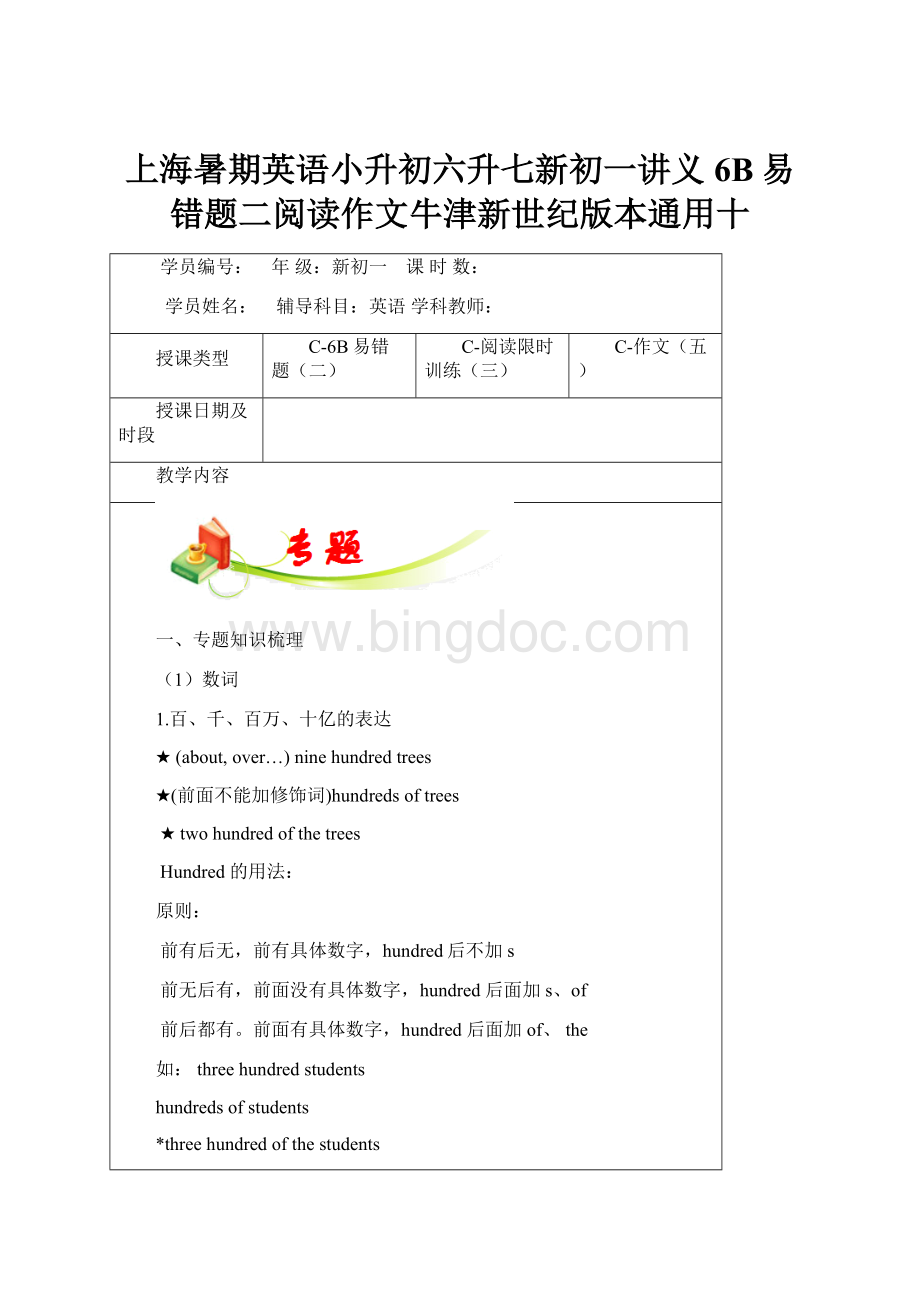上海暑期英语小升初六升七新初一讲义6B易错题二阅读作文牛津新世纪版本通用十文档格式.docx
《上海暑期英语小升初六升七新初一讲义6B易错题二阅读作文牛津新世纪版本通用十文档格式.docx》由会员分享,可在线阅读,更多相关《上海暑期英语小升初六升七新初一讲义6B易错题二阅读作文牛津新世纪版本通用十文档格式.docx(22页珍藏版)》请在冰点文库上搜索。

类似词:
thousand、million和billion的用法一样
▲特别注意:
severalhundredpeople
fewhundredofthevictims
overthreehundredsoldiers
afewhundredteachers
aboutthreehundredmonkeys
manyhundredchildren
2.基数词变序数词的方法:
基变序,有规律,
一二三,特殊记,firstsecondthird
th要从四加起,fourth…
ve要用f代替,fifthtwelfth
八加h,九减e,eighthninth
19,90不去e,nineteenth,ninetieth
词尾是y变ie,thirtieth,fortieth…
然后再加th,
几十几,几百几,thirty-first
前为基数尾用序。
Onehundredandtwelfth
注意:
在某人五十多岁时inone’sfifties
(把基数词几十变成复数twenty–twentiesthirty–thirtiesforty–fortiesfifty–fifties)
3.分数表达:
分子为基数词、分母为序数词,如果分子大于1,分母加s。
one-thirdofthetrees
two-thirdsofthetrees
4.注意下列句子不同的表达方法
(1)twohoursandahalf
→twoandahalfhours
(2)Heisaneight-year-oldboy.
→Theboyiseightyearsold.
(3)It’stenminutes’walk.
→It’saten-minutewalk.
(4)Heisoverfiftyyearsold.
→Heisinhisfifties.
(5)Theriveriseightmetersdeep.
→It’saneight-meter-deepriver.
(2)形容词/副词/系动词
形容词、副词用法区别
用法形容词:
修饰名词,在句中做定语、表语及宾补。
副词:
修饰动词及整个句子,作状语。
形容词做表语,构成系表结构,尤其注意感官系动词+形容词的结构。
常考系动词见下表:
be动词am,is,are,was,were,has/have/hadbeen
感官类look,smell,taste,sound,feel
变化类getworse/turnredder/gobad/growold/becomeangry
不变类keep/stay(keephealthy=stayhealthy)
形容词变副词的变化规则:
(三反、三变、三不变、一特殊)
三反:
以ly结尾的形容词lovely、friendly、lonely
三变:
一般情况下直接加ly;
(correct→correctly)
辅音字母+y结尾的,去y为i,再加ly;
(angry→angrily)
以le结尾的,变le为ly;
(terrible→terribly,gentle→gently,possible→possibly)
三不变:
hard、fast、straight等。
(workhard、runfast、gostraight)
一特殊:
true—truly
形容词副词的三级比较
原级肯定句:
as…as
否定句:
notas…as=notso…as=less…than(注意翻译为“不如…”)
比较级关键词:
than;
修饰词:
much、even、still
最高级关键词:
of、among、in、oneof、thesecond/third…
特殊句型themore…,themore…(the+比较级,the+比较级)“越…就越…”
moreandmore(比较级+比较级)“越来越…”
hotterandhotter越来越热;
moreandmoreimportant越来越重要
any与anyotherShanghaiislargerthan_______cityinNewZealand(新西兰).any
Shanghaiislargerthan_______cityinChina.anyother
个体不在整体范围内,用any;
个体在整体范围内,用anyother。
有the无the形容词最高级前面要加the;
副词的最高级前面通常省略the。
形容词、副词的比较级变化(特殊变化及易错点)
原级比较级最高级
good/wellbetterbest
bad/badly/illworseworst
many/muchmoremost
little(不可数,不规则变化)lessleast
few(可数,规则变化)fewerfewest
healthyhealthierhealthiest
funnyfunnierfunniest
oldolder(表语)oldest(表语)
elder(定语,“年长的”)eldest(定语,“最年长的”)
farfarther(距离上,“更远的”)farthest(距离上,“最远的”)
further(程度上,“进一步的”)furthest(程度上,“最大程度的”)
big、red、hot、thin等需要双写。
形容词变反义词规则
加前缀un-usual→unusual,able→unable,healthy→unhealthy
dis-honest→dishonest
im-/in-possible→impossible,dependent→independent
加后缀-lesscareful→careless,useful→useless
(3)时态
(1)一般现在时:
表示现在经常性,或习惯性的动作。
或表示客观真理。
主要通过时间状语进行判断。
例如:
always,everyyear等。
另一方面,一般现在时也会出现在条件状语从句和时间状语从句中。
例如:
Whenhecomeshere,hewilltellyouthetruth.
(2)一般过去时:
表示在过去的某一时间发生的动作或存在的状态。
此时态的时间状语往往有:
yesterday、lastweek、justnow等。
(3)一般将来时:
表示在将来的某一个时间发生的动作或存在的状态。
在考查中,往往会有相关的时间状语出现。
tomorrow、nextweek、intwodays等。
(4)现在进行时:
表示在现在的某个时间点或者某个时间段正在发生的事情。
表示现在进行时的关键词有:
now、atthemoment、It’sfiveo’clock、look等。
(5)过去进行时:
表示在过去的某个时间或者某个时间段正在发生的事情。
相应的时间状语有:
at8:
00yesterday、fromtwotothreeyesterday。
除此之外,时间状语从句也可以表达过去的某一个点。
HewassleepingwhenIcameback.
(6)现在完成时:
表示过去的动作对现在的影响或者一直持续到现在。
常见的表示现在完成时的关键词有:
already、since、for、sofar、recently等。
二、专题精讲
1.数词
考点:
①hundred、thousand、million的用法;
②分数的表达;
③复合形容词;
④半的表达;
_____aweekdoeskittydoyogatokeepfit?
—Twice.
A.HowlongB.HowoftenC.HowsoonD.Howmanytimes
解析:
回答的是twice,表示的是次数,所以选择D。
2.形容词
①同级比较as…as
②比较级结构;
③修饰比较级的词
④anyother句型;
⑤最高级判断
1.You’dbetterstayathome.Therainisbecoming_______.
A.stronglyB.morestronglyCstrongerD.strongandstrong
become是系动词,后接adj,且是比较级,选择C。
2.LifeOfPiebyLiAnisoneof_______Ihaveeverseen.
A.greatestfilmB.thegreaterfilmsC.thegreatfilmD.thegreatestfilms
oneof后接最高级和名词复数,选择D。
3.Sandylooked______attheEnglishtestpaperandlookedunhappy.
A.carefullyB.carelessC.carefulD.care
lookat后接副词选择A。
4.Doyoufeel________?
Itis________foryourhealth.
A.good,goodB.good,wellC.well,goodD.well,well
feel和is都是系动词,后接adj,well只在表示身体好的时候作副词用,所以选择C,意思是你身体感觉好吗?
这是对你健康有益的。
5.Thewindbecame______andthecloudsmoved______.
A.stronger…slightlyB.strong…heavilyC.stronger…quicklyD.strong…immediately
become系动词后接adj,move是动词,后接副词,根据句意选择C。
3.系动词
Howdidyoumakethebaby___________?
A.tostoptocryB.tostopcryingC.stoptocryD.stopcrying
make后接动词原形,stopdoing。
选择D。
4.时态
①现在完成时;
②havegoneto/havebeento/havebeenin
③主将从现
1.It________finetomorrow.Tom________seeafilm.
A.willbe,willgoingtoB.willbe,isgoingto
C.isgoingto,willD.isgoingto,isgoingto
tomorrow为将来时,be动词将来时:
willbe或者isgoingtobe;
后面see的将来时:
willsee或者isgoingtosee选择B
2.In15years’time,Johnastrongandsmartyoungman.
A.isB.wasC.hasD.willbe
In15years’time为将来时,选择D。
3.Cleanersbegantocleanthestreetsafterthetyphoon_______.
A.passB.pastC.passedD.pasted
began是过去式,所以选择passed。
Past是介词,需要和动词一起用。
三、专题过关
1.Inourschool________studentscansearchtheInternetforusefulinformationnow.
A.threehundredsB.threehundredof
C.hundredofD.hundredsof
2.Ittakesabout______totravelfromshanghaitoHainanislandbyplane.
A.twohalfhoursB.twoandhalfhours
C.twoandahalfhoursD.twohoursandhalf
3.Itis2:
30inthemorning.Thereis________trafficinthestreet,isthere?
A.fewB.afewC.littleD.alittle
4.Maryisagooddoctorandshehelpstomakesickpeople.
A.goodB.wellC.betterD.best
5.The______studentsarewatchingthe_______race.
A.exciting,excitedB.excited,excitingC.exciting,excitingD.excited,excited
6.Intenyear’stime,Janetwillbecomemore_______.
A.heavierB.beautifulC.healthierD.health
7.________heisilltoday.
A.PossiblyB.ProbablyC.MaybeD.Perhaps
8.Therewillbe________trafficjamsinShanghaiinthefutureifwetravelbyunderground.
A)fewerB)moreC)littleD)much
9.Don’twatchtooTVprogrammes.Theyarebadforyoureyes.
A.muchB.oftenC.longD.many
10.Thetyphoonblew___________andkilledmanypeopleinthesmallvillage.
A.tightlyB.lightlyC.fiercelyD.slightly
11.Monkeysareoneofthemost___________.
A.intelligentanimalsB.cleveranimalC.brightanimalsD.cleverestanimals
12.Studentsmustkeepthereadingroom___________whentheyareinit.
A.quiteB.quietC.quietlyD.cleanly
13.Thegoodnewsmakesus________.
A.veryhappilyB.veryhappyC.tobehappyD.tohappy
14.Youlooktodayandsmilesallthetime.
A.happy…happyB.happily…happyC.happy…happilyD.happily…happy
15.You_______mewaitingfortwohours.I______foryousincefive.
A.kept,waitedB.havekept,waitedC.kept,havewaitedD.havekept,havewaited
16.Whentheteacher_____theclassroom,thestudentswerereading.
A.entersB.enterC.enteredD.wasentering
17.They_____wearglasses.
A.haven’ttoB.needn’ttoC.don’tneedD.don'
thaveto
18.Theheadmaster__________Britain.Ihearhewillnotcomebackuntiltheendofthenextmonth.
A.wenttoB.hasgonetoC.hasbeentoD.hasbeenin
19.Ifit__________rainytomorrow,wewillgotheretohaveapicnic.
A.isn’tB.willnotbeC.doesn’tD.isnotgoingto
20.Ifyougoshoppingthisafternoon,I_____withyou.
A.wentB.goC.willgoD.togo
四、学法提炼
1.数词注意构成的方法和后接的谓语的单复数。
2.形容词/副词/系动词:
注意区分形容词和副词,同时,所填的级也要注意。
3.时态:
预初学习的重点时态:
现在完成时、主将从现是重点时态。
在无法确定答案的时候,我们可以采取排除法,逐一验证四个选项,以将错误答案一一排除后得出正确答案。
A.Choosethebestanswer(根据短文内容,选择最恰当的答案):
“Dreamingmaybethemostimportantpartofsleep.Weallneedtodream.”somescientistssaid.
Dreamstakeupaboutonequarterofoursleepingtime.Peoplehaveseveraldreamseachnight.Dreamsarelikeshortfilms.Theyareusuallyincolour.Somedreamsarelikeoldfilms.Theycometousoveragain.Thatmaybebecausethedreamerisworryingaboutsomething.
Dreamingmaybeawayoftryingtofindananswer.Somepeoplegetnewideasabouttheirworkfromdreams.Theymaythinkabouttheirworkallday.Theseideascancarryoverintodreams.
Sometimeswewakeupwithafoodfeelingfromadream.Butoftenwecan’trememberthedream.Dreamscangoawayquicklyfrommemory.
Toomuchdreamingcanbeharmful.Themorewesleep,thelongerwedream.Themindishardatworkwhenwedream.Thatiswhywemayhavealongsleepandstillwakeuptired.
1.Itmaybelessimportanttosleepthanto_________.
A.thinkB.dreamC.workD.study
2.Dreamsareusually_________.
A.verylongB.incolourC.aboutworkD.verysad
3.Whydosomepeopleoftendreamabouttheirwork?
A.Becausetheyaretiredinthedaytime.
B.Becausetheyarenotinterestedintheirwork.
C.Becausetheymaythinkabouttheirworkallday.
D.Becausetheyhavetoomuchworktodo.
4.WhickofthefollowingisNOTtrue?
A.Dreamsmaybehelpfultopeoplesometimes.
B.Toomuchdreamingmaybebadforhealth.
C.Peoplealwaysremembertheirdreamsclearly.
D.Peoplesometimeswakeuptirediftheyhavealotofdreamswhilesleeping.
5.Thestorymainlytellsus_________.